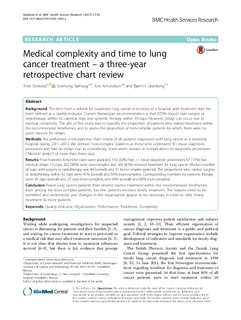Medical complexity and time to lung cancer treatment - A three-year retrospective chart review
Journal article, Peer reviewed
Permanent lenke
http://hdl.handle.net/11250/2443533Utgivelsesdato
2017Metadata
Vis full innførselSamlinger
Sammendrag
Background
The time from a referral for suspected lung cancer is received at a hospital until treatment start has been defined as a quality indicator. Current Norwegian recommendation is that ≥70% should start surgery or radiotherapy within 42 calendar days and systemic therapy within 35 days. However, delays can occur due to medical complexity. The aim of this study was to quantify the proportion of patients who started treatment within the recommended timeframes; and to assess the proportion of non-complex patients for which there were no good reasons for delays.
Methods
We performed a retrospective chart review of all patients diagnosed with lung cancer at a university hospital during 2011–2013. We defined “non-complex” patients as those who underwent ≤1 tissue diagnostic procedure and had no delays due to comorbidity, intercurrent disease or complications to diagnostic procedures (“Medical delays”) of more than three days.
Results
Four hundred forty-nine cases were analyzed; 142 (32%) had >1 tissue diagnostic procedures; 67 (15%) had medical delays >3 days; 262 (58%) were non-complex and 363 (81%) received treatment for lung cancer. Median number of days until surgery or radiotherapy was 48 (overall) and 41 (non-complex patients). The proportions who started surgery or radiotherapy within 42 days were 41% (overall) and 56% (non-complex). Corresponding numbers for systemic therapy were 29 days (overall) and 25 days (non-complex), and 64% (overall) and 80% (non-complex).
Conclusion
Fewer lung cancer patients than desired started treatment within the recommended timeframes. Even among the least complex patients, too few patients received timely treatment. The reasons need to be identified and understood, and changes in the organization appear to be necessary in order to offer timely treatment to more patients.

